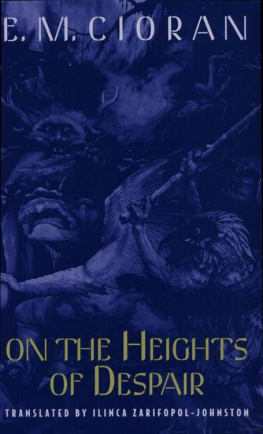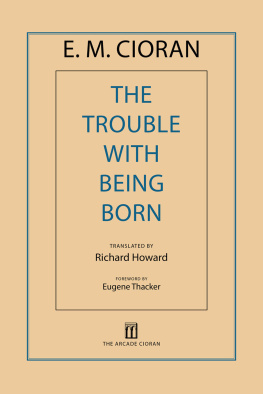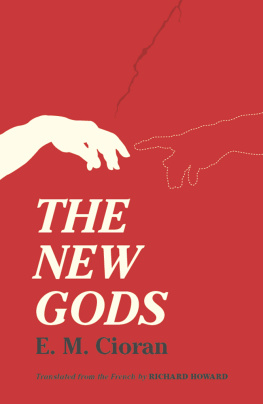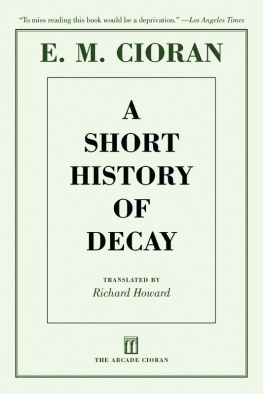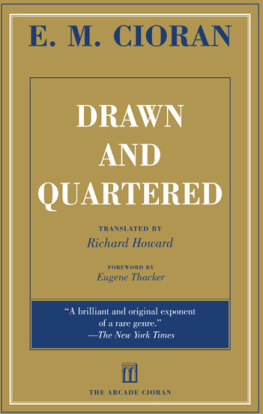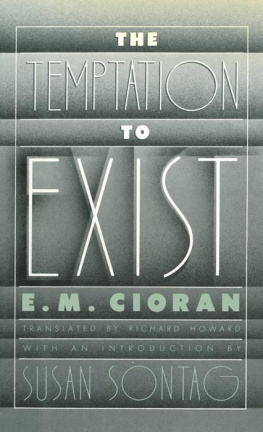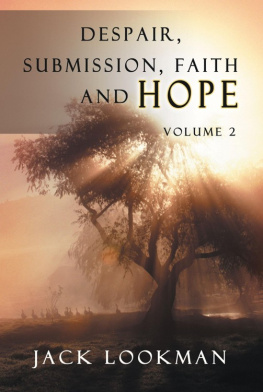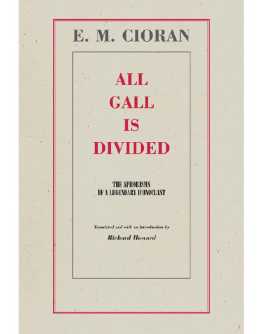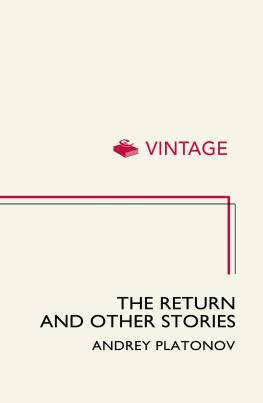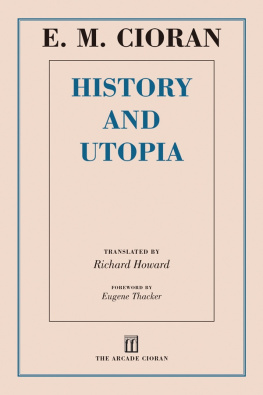On the Heights of Despair
E. M. Cioran
Translated and with an Introduction by Ilinca Zarifopol -Johnston
Chicago & London
The University of ChicagoPress
1990
Acknowledgments
Ithank E. M. Cioran for entrusting me with this book, Matei Calinescu for bringing ustogether, Mme. Simone Boue and Jennie Lightner for their very helpful editorial suggestions, mycousin, Pedro Pidal Nano, for the peace of his houseby the sea where most of this translation was completed, and last but notleast, my husband, Kenneth R. Johnston, whose fine sense of the Englishlanguage shines forth through the book and helped bring it to life a second time.
Thistranslation was made possible by grants from Indiana University (Office ofResearch & Graduate Development and Russian & East European Institute)and the Andrew W. Mellon Foundation.
Ilinca Zarifopol -Johnston
Introduction: Imagining Cioran
Imagining the author is part ofany reading experience. For the translator, even more than for the ordinaryreader, the author, or that fiction named Author, is a personal obsession. LikeJacob who wrestled a mysterious being all night long, the translator strugglessilently with the author until he blesses him or lets him go. Like Jacob, hewants to know his opponent, to see him face to face, is haunted physically andspiritually by the author's face, his name, his strength, his style. So Istruggled with Cioran , and for a long time I imaginedhim like a spirit conjured up from the lines of his text as from a witch'sbrew: a leonine head, Zarathustra's voice, dramatic poses alternating betweenthose of a biblical prophet and a Western dandy. Above all, I saw him asfrightfully young and precocious, with an uncanny affinity for suffering and adiabolical propensity for self-torture, an enfant terrible full of somber andcruel vitality, dangerously playing at philosophy, toying with poisonous andlethal thoughts.
But my Cioran has a historical dimension still recoverable from a not-too-distant past. He isa young intellectual from Romania's politically troubled interwar period.Along with Eugene lonesco , the absurdist playwrightand member of the Academic franfaise , and Mircea Eliade , the philosopherand historian of religions, he participated in Romania's cultural Renaissanceduring the 1930s. He belonged to Romania's "Young Generation," her"angry young men," who , in Matei Calinescu's words, represented"a generation whose creed was based on the primacy of youth over oldageyouth being equated with spiritual fervor, authenticity, creativity,idealism, while old age symbolized routine, inertia, political corruption andpetty materialism." As Calinescu points out,1934, the year when On the Heights of Despair wasfirst published, was one of the high points of the 1930s in Romania. Eliade published five books, among them a study inreligious anthropology which contains the main ideas of The Forge and the Crucible (1962), and lonesco published his only major Romanian book, a volumeof deconstructive literary criticism titled No .
Though younger than either Eliade or lonesco , Cioran was no less interesting. His intense personalityinvited fictionalizing early in his life. Calinescu ,for example, recognizes an early portrait of the young Cioran in the character of tefan Parlea (the name suggests conflagration) from Mihail Sebastian's 1934novel, For Two Thousand Years, wherehe is the author of an essay provocatively titled, "Invocation for anInvasion of the Barbarians as Soon as Possible." He embodies "the nihilistic-apocalypticsensibilities of the young generation of Romanian intellectuals."
It was hard for me to reconcilemy fictional Cioran with his historical origins. Thevoice which in On the Heights of Despair vehemently denounces Christianity, and the man who wrote the startling essay "TheFlight from the Cross," clash with the image of the real-life Cioran , son of a Romanian Orthodox priest. He was born inthe Transylvanian mountain village of Rainari , famousin Romania not only for its natural beauty but also as the home and the finalresting place of other cultural figures of national renown, the poet Octavian Goga and the enlightened Orthodox bishop-scholar ofTransylvania, Andrei aguna . As a young teenager, Ionce passed through Cioran's village. The idyllicvillage, with its stone-paved, uneven streets and ancient peasant houses, waslike a place out of time, an enchanted, mythical site. A mysterious richnesshung about it, entrancing, heavy, and luminous like the golden glow of thesilent summer afternoon I spent in its gardens and orchards. And I know nowthat on my way to the cemetery to visit Bishop aguna's tomb I passed Cioran's family house. It was my firstunwitting encounter with him, who has been for the last few years my private obsessivefiction, and to whom, in my linguistic struggle, I have clung like Jacob tohis angel.
I am no Jacob, and Cioran is no angel, except perhaps a sly one of the devil'sparty. But for as long as I have known of his existence, hehas been hard to grab hold of and impossible to pin down. When I was astudent in Romania in the 1960s and 1970s, he was a mysterious, almostmythological, presence. One would hear that such a person existed, but it wasimpossible to read him. His French books were neither sold nor published intranslation, and his Romanian books had disappeared without a trace, the rarestof rare books. Although he had departed his homeland some ten years before thewar and the Communist takeover, he was as invisible as the most unspeakable, or unnameable , of nonpersons. When I came to America inthe late 1970s, I found that he was well known in elite intellectual circles,though he remained as elusive and mysterious as ever. His Romanian books arestill literally rare, available only from special collections. The present bookis the first translation of Cioran from his nativelanguage into English. At last, I have got hold of him, and for at least the space of one translationthat most provisional of artsIhave pinned him down for others to see and read. Granted, he is a specializedtaste, too sharp and bitter for many palates and, paradoxically, too lyricaland funny for some others. Yet Sartre has always had a large following inEnglish, and Cioran is in my estimation a betterpure writer than Sartre or any of the postwar French existentialists. Hisstylistic incisiveness has led some French critics to put him in the same classas Paul Valery, an ultimate accolade of linguistic purity. But the shocking,bracing verve of his existential despairand good humoradmits hisphilosophical prose to the company of Nietzsche and Kierkegaard.
As I tried to imagine my Cioran , I kept replaying in my mind that day of long agowhen I first brushed by his invisible presence, and I wondered how I couldrelate my "nihilistic-apocalyptic" Cioran to the details I still remembered so well: the mountain air shimmering withhues of gold and green and blue, the still, heavy, yet happy torpor of aslumbering summer day in a remote village where the only sign of activity wasthe buzz of lazy drones on leaves of grass. And was it my Cioran that I had almost touched, or just a ghost he had long left behind, whose namewas only secretively whispered in Romania for the past twenty-five years?Instead of an answer to my puzzlement, I found in Cioran's own writing a confirmation of the irredeemable incompatibility I sensedbetween the place and the man. In The Temptation toExist (1956), he writes about his origins:
The paradox of being... [a Romanian]is a torrent one must know how to exploit.... Hating my people, my country,its timeless peasants enamoured of their own torporand almost bursting with hebetude, I blushed to be descended from them....Unable to shove them aside, or to animate them, I came to the point of dreamingof an extermination .
Ina lighter vein, when I first visited him last summer, he also recalled, as aconfirmation of this incompatibility between himself and his origins, ahumorous family anecdote concerning the scandal stirred up in his remote nativeregion by his first nihilistic book, On the Heights ofDespair. His father, a priest, and his mother, head of theChristian Women's League, kept a very low profile, and weathered the storm byhiding in the house with the lights off and going to bed very early for weekson end.

